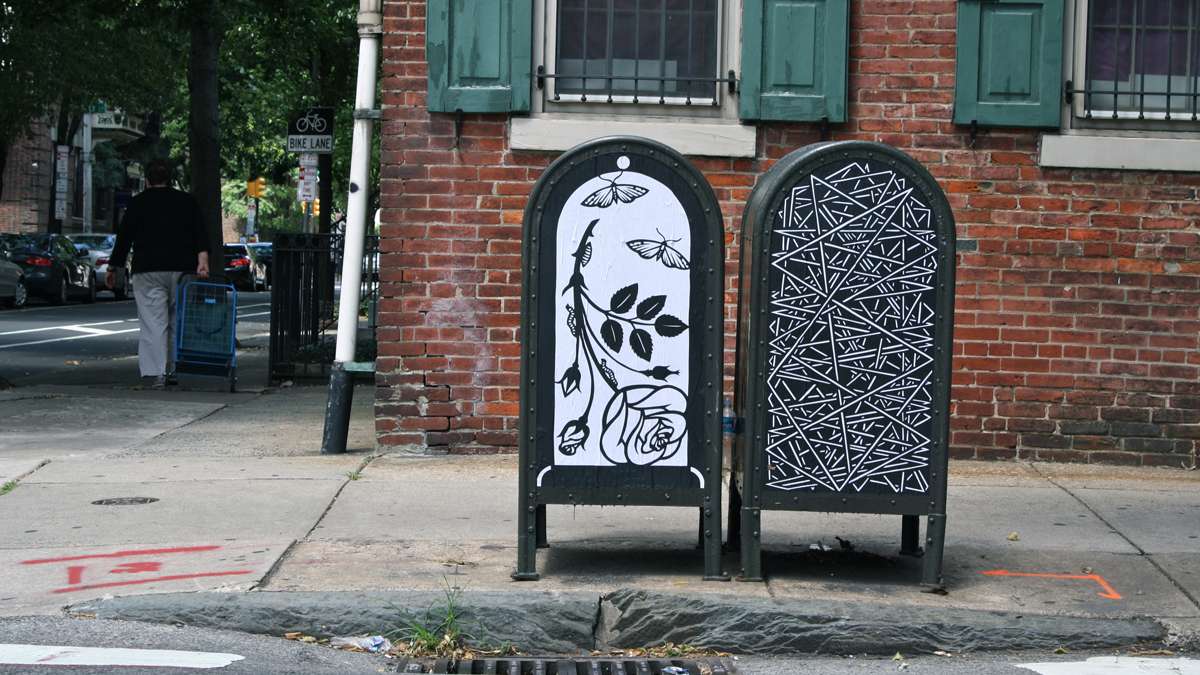Queen of Jeans front woman forges an identity as a band and an artist
Take a masculine Philly icon and turn it around into feminine flaunt That’s how the band Queen of Jeans got its name.
“One day we were all chatting,” says lead singer and songwriter Miriam Devora. “Nina [Scotto, bassist] said the King of Jeans sign was going down. The logo was a super-masculine sort of suggestive picture, a man in a nice pair of jeans bending down toward a woman. People in South Philly know it, it’s sort of iconic. To see the sign go down was a significant day for South Philly. So we thought we’d turn the name into Queen of Jeans.”
That theme of defining and owning one’s identity is central to Devora’s growth as an artist, and Philadelphia itself is central to the band’s formation. Devora, Scotto, lead guitarist Matheson Glass, and drummer Patrick Wall all hail from Philly and live in the area of East Passyunk. Devora met Glass and Scotto a couple of years ago when they were all at threshold moments in their growth in the Philly music scene.
“Initially I was trying to do a solo project with these songs,” Devora says. “I was in another band. I’d always felt I’ve never really been the leader in bands in the past. I’d write songs and imagine them a certain way, then they’d go a different direction when we were together. I was ready for a project that was mine, where I could step out from another person’s shadow.”
Turns out Scotto and Glass were the right complement. “They performed together already, and they play off of each other very well,” Devora says. “They wanted something with the pressure off of being the leader. I was ready to take the reins. I already had the pieces written. We started playing it together. It just worked.”
She describes the sound of the female-fronted band as “’60s girl group-influenced vocal harmonies and textured melodic pop instrumentation.”
Opening up on stage
That was about a year ago. And they’ve made good use of the time. The band worked with WXPN, producer Brian Ziprin, and artist Steven Arnold, among others, and the release party for their first and self-titled EP is Jan. 30 at Kung Fu Necktie in Philadelphia’s Fishtown neighborhood.
“We all like being part of the social scene,” Devora says. “There are a lot of incredible bands. I’m very proud of the music scene in Philly. There’s a lot of talent here, it’s nice to be part of that.”
The basis of the EP is the body of work Devora had in motion when she hooked up with Scotto and Glass. But far from feeling like an ending, for her the release is a next step in her own growth, both as a songwriter and as a performer, and the connection between the two.
“I still always feel like I’m trying to get better in the stage performance aspect,” she says. “When you’re writing, you go into yourself: What am I trying to express and share with other people? Then when you step onstage, you sort of clam up at first — it’s hard sometimes to break out of that shell. Like, I’m about to share some intimate things.”
She had an especially thrilling moment recently at the Foundry at the Filmore as an opening act for the Red Bull Sound Select show curated by JUMP Philly. “Sometimes when you’re an opener for another show, there aren’t many people in the crowd,” Devora explains. But this was different. The house was packed with some 450 people as Queen of Jeans took the stage around 9:30 p.m.
“It was pretty intense! I don’t think I looked out at the crowd much. I looked at the other girls.”
Being human, and being OK with it
Being onstage is electric, but so is being in the studio. She says their producer, Brian Ziprin, is a “guitar nerd” who brought great technical savvy to their musical imagination.
“We’d say, ‘I want the guitar to sound like it’s underwater,'” Devora recalls. “He’d plug a bunch of things in, and he would do it. He knew what we wanted in a technical way, when we said ‘underwater.'”
From the stage to the studio and back to her own writing, the experience of creating and releasing the EP has taken Devora further toward her own self-acceptance. “A lot of the songs sound like love songs,” she says, “but there’s a different meaning to them than that. The best song … is a song to myself. I don’t want to feel like I’m faking it all the time, and to accept the person that I am. I feel like, with every person you meet, you put on a different mask and try to blend with them and speak to them as you think they want you to be. That song is me fighting with myself. But out of that frustration came a song about being happy with myself and the things you can’t change.”
When I laughed and said I could relate, Devora added: “Everybody’s got that story but that’s what humanizes us. I have heroes who are musicians, but what makes me respect them is that they humanize themselves. They let themselves be vulnerable. So I try with my music to be honest.”
And perhaps in an echo of the exciting moment on the stage at the Filmore, she says: “Though it’s hard to look into people’s eyes when I’m singing, I want to feel a connection to the people I perform for.”
WHYY is your source for fact-based, in-depth journalism and information. As a nonprofit organization, we rely on financial support from readers like you. Please give today.













